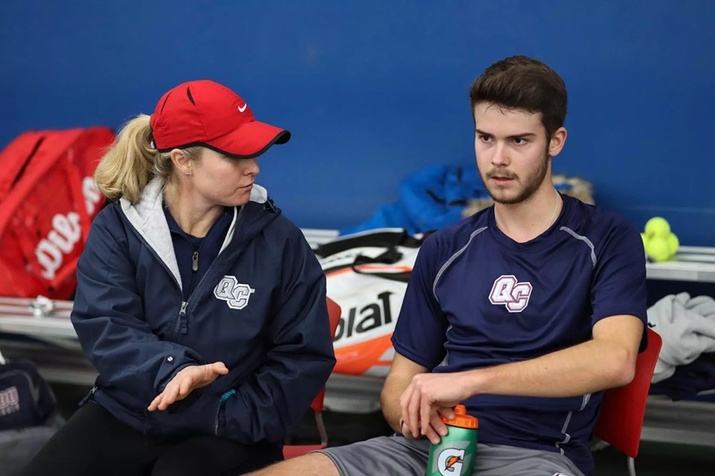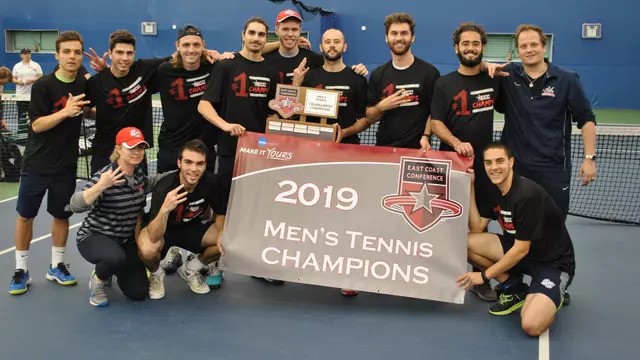In the world of college sports coaching, stepping on the court as a woman in charge of a men’s tennis team isn’t just about strategy and technique, it’s about breaking through barriers and challenging perceptions that have long defined the game. For me, this journey of transformation began on the sunny courts of South Africa, where my love for tennis first took root. There, I learned early on that nothing comes easy and that gender should never limit the pursuit of your dreams of excellence.
From a young age, tennis was more than just a game. It was the passion that ignited a fire within me to compete, coach, and lead. Growing up in South Africa, I spent countless hours hitting balls against garage doors, dreaming of one day playing competitively. Those early moments shaped my path and instilled in me a deep determination to succeed in the sport I love.
Getting into coaching isn’t just about pursuing a career. It was about championing inclusivity, demonstrating that effective coaching transcends gender, and demonstrating that women can excel in roles traditionally held by men. From athlete to coach, each step has been driven by a passion to redefine what is possible and inspire others to pursue their dreams without limitations based on gender.
As I transitioned from my playing career to coaching, I soon became aware of the surprising reality of college sports coaching. In particular, the field of men’s team coaching was overwhelmingly dominated by men. This recognition gave me the motivation and determination to not only establish my own place in this environment, but also create opportunities for other women aspiring to get involved in coaching.
Seeing predominantly male coaching staffs across college sports motivated me to challenge the status quo. As then, I believed that diversity in coaching enriches the sport and provides a variety of perspectives and approaches that benefit both players and teams. My journey wasn’t just about personal accomplishment. It has become a mission to break down barriers and pave the way for gender diversity in sports leadership.
There were many difficulties on the way to securing that position. During the grueling interview process, subtle hints of skepticism about my ability to handle the men’s squad were raised in the form of analytical questions. However, each inquiry served as a platform to clarify my vision for my team’s success and outline my strategic approach to achieve it. I strongly believed that my gender should never be a deterrent, but rather a testament to my unique perspective and coaching abilities.
My journey as a coach began supporting women’s teams, providing invaluable experience in nurturing talent, building team cohesion and creating a supportive environment. This was a fundamental step in my coaching journey where I learned the intricacies of leadership and player development. However, as I gained more confidence and experience, I felt the need to take on a new challenge. When the opportunity arose to coach a men’s team, I saw it not only as a career advancement, but also as an opportunity to break stereotypes and show that effective coaching transcends traditional gender roles and expectations.
Stepping onto the court as the head coach of a men’s college tennis team was both exciting and scary. The players were talented, motivated and eager to improve under my guidance. But I felt that behind their passion, there was an unspoken doubt about whether women could lead them to victory. It was difficult to earn their respect and prove that my gender did not define my coaching abilities.
One of the biggest obstacles was striking a balance between authority and accessibility. As a woman coaching men, there is a fine line to walk: asserting leadership without being arrogant, and demanding respect without compromising your standards. I have realized the importance of establishing clear communication and mutual respect. It was about building relationships based on trust and demonstrating that gender does not dictate your ability to strategize, motivate and lead. It was about building relationships based on trust and demonstrating that gender does not dictate your ability to strategize, motivate and lead.

In speaking with both male and female coaches, I was exposed to different perspectives. Some men’s coaches have expressed doubts about my ability to respect and manage the competitive dynamics inherent in men’s college tennis. Many people have raised concerns about whether my coaching style will resonate with male athletes, given the differences in communication and leadership styles between genders. Their concerns highlighted the pervasive stereotypes that still dominate sports coaching, and expressed skepticism and respect for women taking on leadership roles in male-dominated sports and their ability to deal with the competitive nature of men’s college tennis.
When I spoke to most female coaches, they were hesitant to coach men’s tennis teams due to a variety of social and cultural factors. Historically, sports coaching, especially on male teams, has been dominated by men, perpetuating the stereotype that male coaching requires a certain confidence and authoritative attitude that more naturally suits male coaches. These stereotypes are creating uncertainty about female coaches and their ability to respect and effectively manage the dynamics of male teams. Additionally, the lack of representation of women in coaching roles in men’s sports reinforces the perception that coaching men is an unconventional path for women. Cultural expectations and ingrained gender norms further compound this rejection, as women may internalize societal beliefs about their roles and abilities in sports leadership. Despite these challenges, many women have successfully overcome these barriers, proving their capabilities and paving the way for increased gender diversity in coaching roles across all levels of sport.
On the other hand, there were several female coaches who showed unwavering support and solidarity by sharing their experiences entering traditionally male-dominated fields. Focusing on solidarity and encouragement, they emphasized the importance of perseverance and determination in navigating the challenges ahead, shared their experiences entering male-dominated fields, and offered strategies for navigating the challenges ahead. Their encouragement was invaluable and provided insight into effective strategies for building trust and fostering a positive team culture. These diverse perspectives, from skepticism to support, have highlighted the complexity of gender dynamics in college sports coaching and strengthened my commitment to breaking down barriers and paving the way for greater gender equality in the field.
A woman of great influence, who recognized my potential to lead a successful program, offered me the opportunity to coach a men’s team. This gesture reinforced my belief that mentorship and support from women in positions of power is critical to empowering the next generation of female coaches.
From personal experience, taking on the role of head coach of a men’s college tennis team was both exciting and daunting. Every practice, game, and season has provided an opportunity to challenge stereotypes and redefine expectations. In addition to the technical and strategic aspects of coaching, I find myself navigating the complexities of leadership and trying to maintain a balance between authority and accessibility. Building trust and fostering open communication has become paramount as we strive to earn the respect of players and teammates alike.
Statistics highlight this gap. Only a very small percentage of college tennis coaches are women, and even fewer are in positions where they coach men’s teams. This reality has added weight to my role not only as a coach but as a pioneer. According to recent data, women wear makeup 26% of directors NCAA Division I men’s sports highlight the rarity of women in leadership roles in the field. Despite the odds, my presence on the court was a daily reminder that coaching ability transcends gender.

Just a few years ago, I was in the unique position of being the only female coach in the country dedicated to a men’s team. As a pioneer in this regard, I am motivated to advocate for more opportunities for women in coaching roles, highlighting the importance of inclusivity and breaking down barriers in the sports industry.
In addition to coaching, he also serves as the chairman of the men’s national team rankings committee. d2 Tennis, oversees the rankings process and ensures fairness and accuracy in college tennis competitions. This role has allowed me to contribute to the sport at a wider level, as well as highlighting the importance of diversity in coaching.
More women are taking on coaching roles in college sports, and the conversation about gender equality in athletics continues to evolve. Although the road ahead remains difficult, the progress and victories achieved serve as a testament to the power of perseverance and belief in one’s own abilities.
Coaching a men’s college tennis team was not just a job. It was a platform to advocate for gender equality and inclusion in sports leadership. Our success on the court is powerful evidence of the impact of diversity in coaching. Each victory, each milestone became a stepping stone toward a future where gender does not determine opportunity or achievement.
There were moments of doubt, times when the pressure to perform seemed to be heightened by the scrutiny of my gender. But as the season went on, the wins increased and perceptions changed. The success of the team under my leadership spoke volumes, challenging the notion that men’s sports are coached only by men.
Ultimately, we need to look beyond winning on the court. Tennis coaching is a platform to bring about change. I have seen firsthand how my presence has motivated young women to consider a career in coaching and encouraged young men to embrace gender equality in sports leadership. It wasn’t just about coaching. To be a role model that shows what is possible when passion, skill and determination come together.
As I reflect on my journey today, I am reminded of the progress I have made so far and the work I still have to do. More women are taking on coaching roles in college sports, but the road remains arduous. By sharing my story and experiences, I hope to inspire both men and women to challenge boundaries, embrace diversity, and advocate for equality in sports and beyond. Coaching a men’s college tennis team isn’t just about winning matches. It was about breaking down barriers and paving the way for a more inclusive future in sports coaching. As I continue to lead and inspire, I hope my story will encourage others to challenge boundaries, embrace opportunity, and pursue their passions, regardless of gender.






